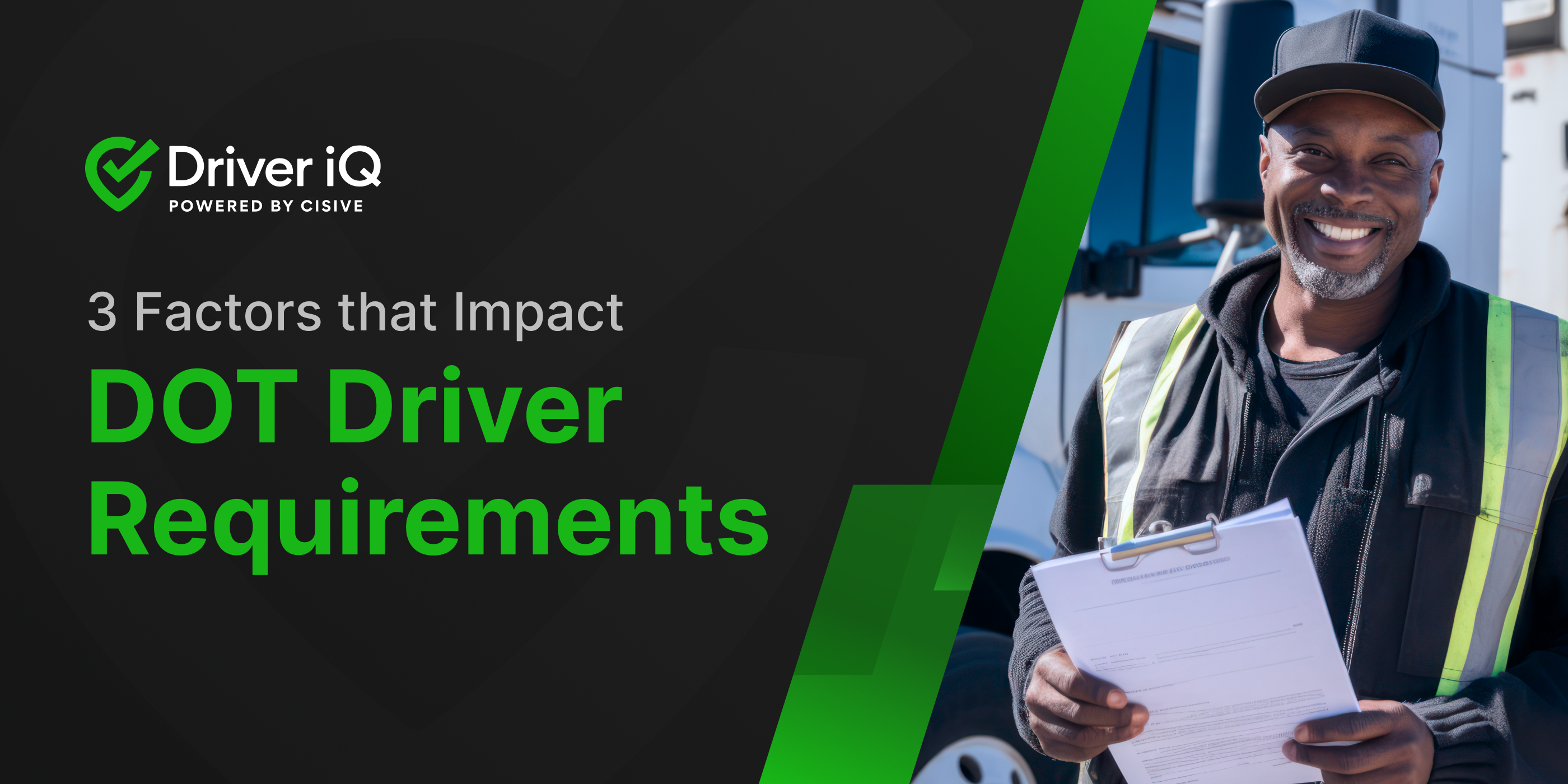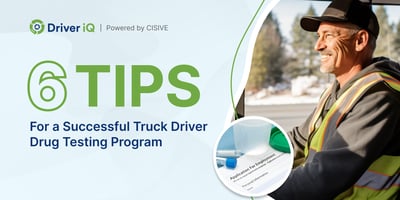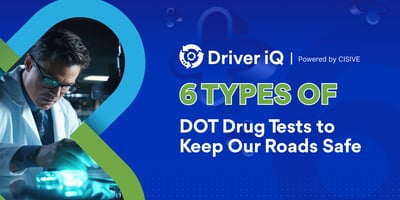

Secure and reliable transportation networks rely on commercial drivers who are fit for duty and...

If you own or operate a trucking company, you already know how important it is to ensure your vehicles comply with all federal and state regulations. These rules ensure the safety of truck drivers and other motorists on the road.
Your trucks aren’t the only thing the government regulates. It also has a number of rules and regulations in place that DOT compliance drivers must follow in order to receive and maintain their CDL license.
This article dives deeper into CDL truck driver regulations set by the Federal Motor Carrier Safety Administration (FMCSA). It’s important to understand these regulations and remain compliant at all times.
Key TakeawaysHere are the key things you need to know about DOT driver requirements for CDL truck drivers.
|
There are numerous reasons the Department of Transportation regulates who can and cannot operate commercial motor vehicles, including:
The FMCSA's number one mission is to “reduce crashes, injuries, and fatalities” involving truck drivers. Truck driver regulation is part of this mission.
Every regulation put in place is designed to protect both truck drivers and other motorists on the road.
While individual states can create additional rules and regulations pertaining to truck drivers, every licensed trucker in the United States must meet the minimum FMCSA driver qualifications. This standardization across states helps to bring conformity to the trucking industry.
Ensuring drivers are qualified to operate a commercial motor vehicle can also protect motor carriers. For instance, if a trucker is in an accident, your trucking business can use information in its Driver Qualification File (DQ File) to prove that it did its due diligence in hiring a qualified driver.
Efficient supply chain management is imperative in today’s global economy. Having standards in place to make sure all truck drivers meet specific criteria can help with this process.
Recommended Reading: Recruiting Truck Drivers
The Department of Transportation has a number of driver requirements in place to determine who can and cannot drive a commercial vehicle. Whether you’re a truck driver or manage a trucking company, it’s important to understand these DOT regulations and ensure only qualified drivers get behind the wheel of a commercial motor vehicle.
For example, all intrastate truck drivers must be at least 18 years old, while interstate truckers and those hauling hazardous materials must be at least 21 years old. Below is a look at some other DOT driver requirements.
Truck drivers operating commercial vehicles that meet the state’s requirement must have a commercial driver’s license (CDL). The class of your CDL license or any required endorsements depends on the type of truck you’re driving and the material you’re transporting.
To qualify for a CDL license, you must be at least 18 or 21 depending on the type of transport, and pass a vision test. You must also have a current Class C license for non-commercial driving that is not suspended.
When testing for your CDL license, you must pass a three-part skills test that includes a basic controls test, a vehicle inspection test, and a road test. A truck driver cannot hold a CDL license in more than one state and must report every state where they’ve held a license in the past three years.
The FMCSA requires employers to review motor vehicle records for all new hires to ensure their eligibility and inquire about the driver's safety performance history from previous employers. Employers must also recheck these motor vehicle records every 12 months.
Driver iQ can help with this new hire screening process and provide ongoing license monitoring to ensure compliance.
Truck drivers in the United States must also be able to speak and read basic English. While English doesn’t need to be the driver’s first language, they must be able to hold a basic conversation, understand and obey all traffic signs, answer officer’s questions accurately, and complete all reports and logs as needed.
Before receiving a CDL license, drivers must pass a physical examination performed by a qualified doctor and receive a Medical Examination Certificate.
Individuals with specific handicaps, such as loss or impairment of feet, hands, or legs, or a serious medical condition, including respiratory dysfunction, diabetes mellitus, or rheumatic arthritis, may be restricted from driving a commercial motor vehicle. The only exception is if the individual receives a Skills Performance Evaluation Certification that proves their ability to safely operate the vehicle.
Truck drivers must also pass a knowledge test for each class and endorsement they want to be attached to their CDL license. These tests are designed to ensure the driver understands any special requirements or safety precautions associated with that class or endorsement.
Drivers who haven’t completed and passed this knowledge test cannot drive the type of vehicle or transport the type of material. For example, a CDL driver cannot transport hazardous materials unless they have an 'H' endorsement on their license.
FMCSA requires drivers applying for a Class A or Class B CDL license for the first time to complete the entry-level driver training course prior to testing. The same is true for current drivers who want to upgrade their Class B CDL license to a Class A, as well as those testing for a school bus (S), passenger (P), or hazardous material (H) endorsement.
Interested individuals and trucking companies should consider these regulations when determining the time it takes to obtain a CDL license or special endorsement.
Recommended Reading: Best DOT Compliance Services
There are several factors influencing DOT requirements and the type of CDL license each driver needs. It’s important to understand these factors and ensure you have the right qualifications for the type of truck you’re driving or your trucking company uses.
Below is a look at some of these factors.
There are three main classes of CDL licenses for commercial truck drivers. These classes are broken down by the type of truck the driver can operate.
The following table provides more information about the three classes of CDL licenses.

Depending on the type of vehicle and the materials being transported, CDL drivers may require a special endorsement. CDL drivers must successfully pass a knowledge test to earn these endorsements.
The table below takes a closer look at several CDL endorsements available.

Depending on the specific situation, the Department of Transportation may restrict the driver from operating certain types of vehicles.
Below is a look at the most common restrictions for CDL drivers.

Employers must do their due diligence when determining if a new hire might have a drug or alcohol issue. FMCSA regulations require employers to ask prospective employees if they have ever failed or refused to take a drug or alcohol pre-employment test in the past.
If the prospective candidate admits to a failed or refused drug test, they must complete the return-to-duty process before getting behind the wheel.
Many trucking companies also screen new hires and current employees regularly to ensure the safety of their operations.
Driver iQ can help you with this process by providing comprehensive, accurate drug screening. We also provide background checks to ensure you’re hiring the right drivers for your company.
Recommended Reading: Dot vs Non-Dot Drug Test
There are several things your company can do to ensure compliance with the numerous DOT requirements, including:
As a trucking company manager, it’s important to understand the specific needs of your fleet. For instance, does your company conduct interstate or intrastate transport, haul hazardous materials, or use double or triple trailers?
Knowing the answers to these questions can help you determine what type of special license or endorsement your truck drivers require. This step is critical to ensure compliance with FMCSA truck driver requirements.
You should also regularly check in with your employees to ensure they fully understand all federal and state requirements and that there are no compliance issues. These check-ins may also help identify company-wide issues that require additional training.
One of the most efficient tools for ensuring DOT compliance is CDL screening software. This tool can help your company save time and resources and improve hiring outcomes.
When you partner with Driver IQ you can have peace of mind knowing a comprehensive background check, including applicant screening, employment verification, and a background check, was completed for each new prospect. These services, along with Driver iQ’s ongoing monitoring and drug screening, help ensure DOT compliance.
Don’t risk hefty fines and penalties due to DOT violations. Instead, create a plan to ensure your drivers have the right skills and qualifications to drive the types of commercial motor vehicles your business uses.
At Driver iQ, we understand that no two trucking companies are the same. That’s why we work directly with our clients to ensure they receive the specific services their companies need.
For instance, our CDL screening software makes it easy for you to track the licensure of each new prospect and current employees. Whether you’re looking for truck drivers with a Class A license or you need one with a special endorsement for hauling double trailers or hazardous materials, our team can help.
We can make sure the driver has the right license and endorsement before they get behind the wheel. Additionally, we’ll alert you if any issues arise.
Speak to one of our experts today to learn more about how Driver iQ can help your company maintain DOT compliance.
Author: Michael Kapuschinsky
Bio: Product Manager with more than a decade of experience in the transportation industry.
Let's Connect on LinkedIn
Secure and reliable transportation networks rely on commercial drivers who are fit for duty and...

The transportation industry requires safe drivers. Keeping safe drivers in, and removing dangerous...

If you employ commercial drivers, your company is responsible for maintaining a formal drug testing...